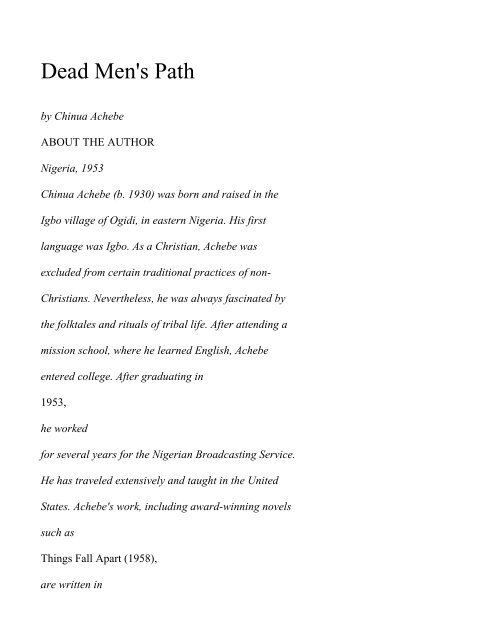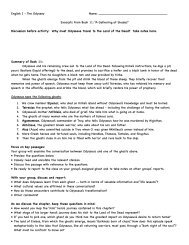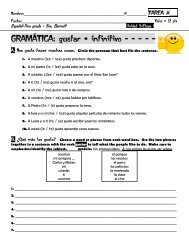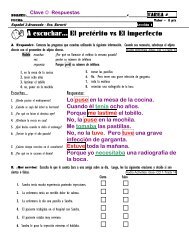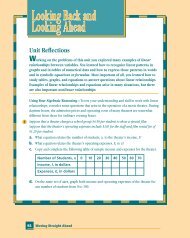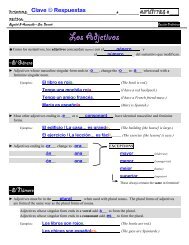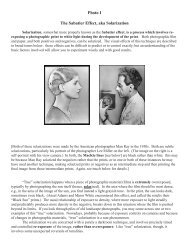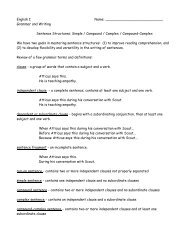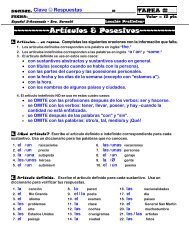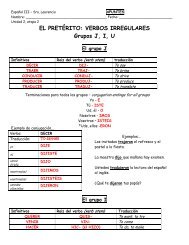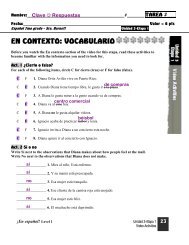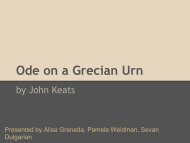Dead Men.pdf
Dead Men.pdf
Dead Men.pdf
- No tags were found...
You also want an ePaper? Increase the reach of your titles
YUMPU automatically turns print PDFs into web optimized ePapers that Google loves.
<strong>Dead</strong> <strong>Men</strong>'s Pathby Chinua AchebeABOUT THE AUTHORNigeria, 1953Chinua Achebe (b. 1930) was born and raised in theIgbo village of Ogidi, in eastern Nigeria. His firstlanguage was Igbo. As a Christian, Achebe wasexcluded from certain traditional practices of non-Christians. Nevertheless, he was always fascinated bythe folktales and rituals of tribal life. After attending amission school, where he learned English, Achebeentered college. After graduating in1953,he workedfor several years for the Nigerian Broadcasting Service.He has traveled extensively and taught in the UnitedStates. Achebe's work, including award-winning novelssuch asThings Fall Apart (1958),are written in
English, a language he uses to reveal both universaland peculiarly African· experiences.THE CONTEXT OF THE STORYThe British gained control of Nigeria at the turn of thetwentieth century. Viewing Igbo culture and beliefs asinferior and barbaric, their missionaries introducedChristianity and Western education. Christianityultimately weakened tribal affiliations. (Note: Nigeriaachieved independence in 1960.)Michael Obi's hopes were fulfilled much earlier than hehad expected. He was appointed headmaster of NdumeCentral School in January 1949. It had always been anunprogressive school, so the Mission authoritiesdecided to send a young and energetic man to run it.Obi accepted this responsibility with enthusiasm. Hehad many wonderful ideas and this was an opportunityto put them into practice. He had had sound secondaryschool education which designated him a "pivotalteacher" in the official records and set him apart fromthe other headmasters in the mission field. He wasoutspoken in his condemnation of the narrow views of
these older and often less-educated ones."We shall make a good job of it, shan't we?" he askedhis young wife when they first heard the joyful news ofhis promotion. "We shall do our best," she replied. "Weshall have such beautiful gardens and everything will bejust modern and delightful ... " In their two years ofmarried life she had become completely infected by hispassion for "modern methods" and his denigration of"these old and superannuated people in the teachingfield who would be better employed as traders in theOnitsha market." She began to see herself already as theadmired wife of the young headmaster, the queen of theschool. The wives of the other teachers would envy herposition. She would set the fashion in everything ...Then, suddenly, it occurred to her that there might notbe other wives. Wavering between hope and fear, sheasked her husband, looking anxiously at him. "All ourcolleagues are young and unmarried," he said withenthusiasm which for once she did not share. "Which isa good thing," he continued."Why?""Why? They will give all their time and energy to the
school." Nancy was downcast. For a few minutes shebecame skeptical about the new school; but it was onlyfor a few minutes. Her little personal misfortune couldnot blind her to her husband's happy prospects. Shelooked at him as he sat folded up in a chair. He wasstoop-shouldered and looked frail. But he sometimessurprised people with sudden bursts of physical energy.In his present posture, however, all his bodily strengthseemed to have retired behind his deep-set eyes, givingthem an extraordinary power of penetration. He wasonly twenty-six, but looked thirty or more. On thewhole, he was not unhandsome."A penny for your thoughts, Mike," said Nancy after awhile, imitating the woman's magazine she read."I was thinking what a grand opportunity we've got atlast to show these people how a school should be run."Ndume School was backward in every sense of theword. Mr. Obi put his whole life into the work, and his
wife hers too. He had two aims. A high standard ofteaching was insisted upon, and the school compoundwas to be turned into a place of beauty. Nancy's dreamgardenscame to life with the coming of the rains, andblossomed. Beautiful hibiscus and allamanda hedges inbrilliant red and yellow marked out the carefully tendedschool compound from the rank neighborhood bushes.One evening as Obi was admiring his work he wasscandalized to see an old woman from the villagehobble right across the compound, through a marigoldflower-bed and the hedges. On going up there he foundfaint signs of an almost disused path from the villageacross the school compound to the bush on the otherside. "It amazes me," said Obi to one of his teacherswho had been three years in the school, "that you peopleallowed the villagers to make use of this footpath. It issimply incredible." He shook his head. "The path," saidthe teacher apologetically, "appears to be very importantto them. Although it is hardly used, it connects thevillage shrine with their place of burial.""And what has that got to do with the school?" askedthe headmaster. "Well, I don't know," replied the other
with a shrug of the shoulders. "But I remember therewas a big row some time ago when we attempted toclose it.""That was some time ago. But it will not be used now,"said Obi as he walked away. "What will theGovernment Education Officer think of this when hecomes to inspect the school next week? The villagersmight, for all I know, decide to use the schoolroom for apagan ritual during the inspection."Heavy sticks were planted closely across the path at thetwo places where it entered and left the school premises.These were further strengthened with barbed wire.Three days later the village priest ofAni called on the headmaster. He was an old man and walked with aslight stoop. He carried a stout walking stick which heusually tapped on the floor, by way of emphasis, eachtime he made a new point in his argument.
"I have heard," he said after the usual exchange ofcordialities, "that our ancestral footpath has recentlybeen closed ... ""Yes," replied Mr. Obi. "We cannot allow people tomake a highway of our school compound.""Look here, my son," said the priest bringing down hiswalking-stick, "this path was here before you were bornand before your father was born. The whole life of thisvillage depends on it. Our dead relatives depart by itand our ancestors visit us by it. But most important, it isthe path of children coming in to be born ... "Mr. Obi listened with a satisfied smile on his face."The whole purpose of our school," he said finally, "isto eradicate just such beliefs as that. <strong>Dead</strong> men do notrequire footpaths. The whole idea is just fantastic. Ourduty is to teach your children to laugh at such ideas.""What you say may be true," replied the priest, "but wefollow the practices of our fathers. If you reopen thepath we shall have nothing to quarrel about. What Ialways say is: let the hawk perch and let the eagleperch." He rose to go."I am sorry," said the youngheadmaster. "But the school compound cannot be a
thoroughfare. It is against our regulations. I wouldsuggest your constructing another path, skirting ourpremises. We can even get our boys to help in buildingit. I don't suppose the ancestors will find the little detourtoo burdensome.""I have no more words to say," saidthe old priest, already outside. Two days later a youngwoman in the village died in childbed. A diviner wasimmediately consulted and he prescribed heavysacrifices to propitiate ancestors insulted by the fence.Obi woke up the next morning among the ruins of hiswork. The beautiful hedges were torn up not just nearthe path but right round the school, the flowers trampledto death and one of the school buildings pulled down... That day, the white Supervisor came to inspect theschool and wrote a nasty report on the state of thepremises but more seriously about the "tribal-warsituation developing between the school and the village,arising in part from the misguided zeal of the newheadmaster."


